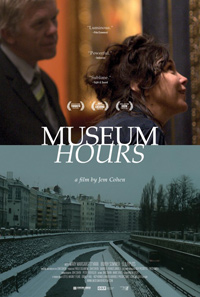Images in Isolation: Cohen’s Meditative Hybrid Explores Time and Existence
 Documentary filmmaker Jem Cohen makes his first attempt at a narrative piece with Museum Hours, which eventually reveals itself as more of a hybrid experience where the characters that have been revealed to us segue into constellations of the structure that brought them together. The film’s effect is much like a an actual visit to a museum, a stiff whiff of cultural pretense that becomes a sense of quiet awe and wonder as one acknowledges in this distilled space the magnitude of time and effort that has gone into the creations, the people, the practices on display. Of course, Cohen’s film manages to reach for a more existential level as a moving image that guides us into his film with a humanistic approach, and slowly becomes a piece of art on its own, turning Kunsthistorisches Museum, and then the architecture and landscape of Vienna into fluid art.
Documentary filmmaker Jem Cohen makes his first attempt at a narrative piece with Museum Hours, which eventually reveals itself as more of a hybrid experience where the characters that have been revealed to us segue into constellations of the structure that brought them together. The film’s effect is much like a an actual visit to a museum, a stiff whiff of cultural pretense that becomes a sense of quiet awe and wonder as one acknowledges in this distilled space the magnitude of time and effort that has gone into the creations, the people, the practices on display. Of course, Cohen’s film manages to reach for a more existential level as a moving image that guides us into his film with a humanistic approach, and slowly becomes a piece of art on its own, turning Kunsthistorisches Museum, and then the architecture and landscape of Vienna into fluid art.
Johann (Bobby Sommer) is an elderly guard at Vienna’s Kunsthistorisches Museum, an introspective and melancholic individual whose inner monologues on his life and work are made evident to us. It is subtly revealed that Johann is gay and he lost his partner some time ago, perhaps filling that void with the continual fascination he experiences contemplating art and observing tourists while he works. Suddenly, he crosses paths with a Canadian named Anne (Mary Margaret O’Hara, cult singer and sister of Catherine), who is in Vienna to look after a cousin currently lying in a coma. Anne knows nothing and no one in Vienna, so she responds warmly to Johann’s kindness as he takes her to various destinations throughout the city. But before we get to know them too well, the film switches gears and retreats to the museum where we spend significant time with a tour guide expounding on the work of Pieter Bruegel, a Flemish Renaissance Painter (Johann also takes pains to celebrate in his own narration). Bruegel was known for his landscapes, and thus, Cohen attempts to reveal Vienna to us in similar fashion.
Ostensibly opening like a heavyhearted introspection into one lonely man’s contemplative existence, Cohen reveals quite a bit of droll wit throughout Johann’s musings. Observations of apathetic youth and the creation of museums (in a compelling discussion related to us through Johann on Late Capitalism) dating back to the Louvre, are just a couple of instances where the director uses his lonely guard to reveal that museums, like Johann, are hardly just the product of a bygone era, but are vibrantly alive in ways taken for granted in today’s consciousness. The museum guide gently argues with her group on hypotheses concerning some of the pieces, but hauntingly quips that people often comment on the timeless quality of them, remarking that they are hardly timeless. In fact, they can’t help but glaringly bear the crushing weight of time.
However, there’s still an inescapable sense of being isolated and even trapped beyond one’s will in Museum Hours. While Anne’s cousin lies comatose, she herself is stranded in a strange city; Johann lives in virtual isolation, a man who used to work in the music industry and professes to love heavy metal; and then there’s the immobile aura of the everlasting museum, where time stands still for those that wish to contemplate the past.
Museum Hours isn’t always the most directly engaging film, instead inviting thoughtful interaction in its silences. Depending on your preference, it may work better as a documentary or a loose narrative, though they sometimes seem at odds, as if we’re drifting gently in and out of one to the other. As Anne comments on her cousin’s status, “Nothing is better and nothing is worse.” It all just is.


